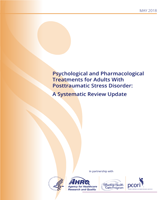From: Results

NCBI Bookshelf. A service of the National Library of Medicine, National Institutes of Health.
| Treatment | N Trials (Subjects) | Findings | SOE | |
|---|---|---|---|---|
| Fluoxetine (SSRI) | PTSD symptomsa | 4 (835)47, 61–63 | Reduced PTSD symptoms SMD −0.28 (95% CI −0.42 to −0.14) | Moderate |
| Depression symptomsb | 3 (771)47, 61, 62 | Similar reduction in depression symptoms SMD −0.20 (95% CI −0.40 to 0.00) | Low SOE for no differencec | |
| Paroxetine (SSRI) | PTSD symptomsa | 2 (348)64, 65 | Reduced PTSD symptoms SMD of −0.56 to −0.44 in individual studies Both studies favored treatment (2 of 2 studies p<0.05) | Moderate |
| PTSD symptom remission | 2 (348)64, 65 | Greater PTSD symptom reduction RD of 0.13 and 0.19 across 2 individual studies (1 of 2 studies p<0.05) | Moderate | |
| Depression symptomsb | 2 (348)64, 65 | Reduced depression symptoms SMD range −0.60 to ‑0.34 across individual studies Both studies favored treatment (2 of 2 studies p<0.05) | Moderate | |
| Sertraline (SSRI) | PTSD symptomsa | 7 (1,085)66–72 | Reduced PTSD symptoms SMD −0.20 (95% CI −0.36 to −0.04) | Lowd |
| Depression symptomsb | 7 (1,085)66–72 | Similar reduction in depression symptoms SMD −0.14 (95% CI −0.33 to 0.06) | Low for no differencee | |
| Venlafaxine (SNRI) | PTSD symptomsa | 2 (687)69, 73 | Reduced PTSD symptoms SMD −0.35 and −0.26 across two individual studies | Moderate |
| PTSD symptom remission | 2 (687)69, 73 | Greater PTSD symptom remission RD of 0.12 and 0.15 across individual studies | Moderatef | |
| Depression symptomsb | 2 (687)69, 73 | Reduced depression symptoms Between-group mean difference of −2.6 and ‑1.6 across individual studies | Moderateg | |
| Prazosin (alpha blocker) | PTSD symptomsa | 3 (117)74–76 | Reduced PTSD symptoms SMD −0.52 (95% CI, −0.90 to −0.14) | Low |
| Topiramate (anticonvulsant) | PTSD symptomsa | 3 (142)77–79 | Reduced PTSD symptoms SMD range of −1.85 to −0.38 across individual studies | Lowh |
| Olanzapine (antipsychotic) | PTSD symptomsa | 2 (47)80, 81 3 (62)80–82 | Reduced PTSD symptoms SMD of −1.15 and −0.96 across individual studies,80, 81 both significantly favored treatment SMD range −1.15 to 0.89 across individual studies All studies favored treatment (2 of 3 studies p<0.05) | Low |
| Risperidone (antipsychotic) | PTSD symptomsa | 4 (422)83–86 | Reduced PTSD symptoms SMD −0.26 (95% CI, −0.52 to −0.01) | Low |
NOTE: Outcomes graded as insufficient are not included in this table. Insufficient evidence was provided for divalproex (anticonvulsant), tiagabine (anticonvulsant), citalopram (SSRI), all TCAs, buproprion (other second-generation antidepressant [SGA]), and mirtazapine (other SGA). No studies that met inclusion criteria rated as having low or medium risk of bias evaluated lamotrigine (anticonvulsant), any benzodiazepine, desvenlafaxine (SNRI), duloxetine (SNRI), nefazodone (other SGA), or trazodone (other SGA).
SMD from Clinician-Administered PTSD Scale and other various PTSD symptom scales.
SMD from the Beck Depression Inventory and other various depression symptom scales.
SOE changed from moderate in the prior review to low for no difference in the updated review. Only 2 of 3 studies favored treatment; one favored placebo. Imprecision, inconsistency, and effect sizes near the null prompted the change in grade.
SOE changed from moderate in the prior review to low in the updated review. The studies were inconsistent in whether findings favored treatment or the inactive comparator group, and findings were imprecise.
SOE changed from low to low for no difference in the updated review. The studies were inconsistent in whether findings favored treatment or the inactive comparator group, findings were imprecise, and most individual study estimates were close to the null.
SOE changed from insufficient to moderate in the updated review because of consistent evidence across two studies of adequate sample sizes.
SOE changed from low to moderate in the updated review because of consistent evidence across two studies of adequate sample sizes.
SOE changed from moderate in the prior review to low in the updated review. The findings were imprecise; only 1 of 3 individual studies found significant differences between study groups, and the sample sizes were small.
CI = confidence interval; N = number; PTSD = posttraumatic stress disorder; RD = risk difference; SGA = second-generation antidepressant; SMD = standardized mean difference; SNRI = serotonin and norepinephrine reuptake inhibitor; SOE = strength of evidence; SSRI = selective serotonin reuptake inhibitor; TCA = tricyclic antidepressant.
From: Results

NCBI Bookshelf. A service of the National Library of Medicine, National Institutes of Health.